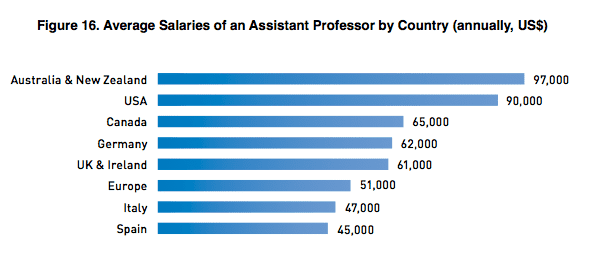The following article is archived and is no longer considered up-to-date. Please interpret its content in the context of the publishing date.

ARCHIVED
How Much Econ Professors Earn? Salaries in Academia by Country
Read a summary using the INOMICS AI tool
Yesterday INOMICS released the Economics Job Market Report 2013 (Worldwide Overview). The report contains insights about the academic job market, compiled from answers from almost 2,500 economists and recruiters from all over the world who completed a survey earlier this year. The findings of the report include salaries, recruiters’ and candidates’ employment preferences, regional disparities, skills & specializations most in demand and other general trends in the economics job market.
Even though salary was not mentioned by economists among the top factors for a job choice, potential earnings do inevitably affect decisions about future career paths. More than that, given the high mobility of the academic job market, where institutions compete for top talent globally, it is natural for candidates to weight their financial gains before relocating to a different country.
The highest salaries were reported by Economics Professors who are employed in universities in Australia & New Zealand (105,000 $US on average), followed by US-based Professors (102,000 $US on average). In Europe, UK Professors earn the most, whereas wages in Italian Universities are on average 40% lower than their British counterparts. The numbers presented in the graph above represent the average income of Full Professors from a given country, based on the responses from our survey, without any adjustments. Of course, when comparing salaries in different countries, a lot of factors should be taken into consideration, including living costs, social security and salary differentials. Nevertheless, these numbers serve as a fair indication of the wage level for academics in each given country.
In the following weeks INOMICS will release a series of Regional Economics Job Market Reports, which will include more detailed information about salaries for different positions and career levels. You can subscribe to receive a notification when reports are released on INOMICS.
Information in the graphs is based on the Economics Job Market Report 2013 (Worldwide Overview). To see more information about methodology download the full report here.
-
- Postdoc Job
- Posted 2 weeks ago
Postdoctoral Research Fellow Opportunity
At University of Notre Dame in Notre Dame, United States
-
- Conference
- Posted 1 month ago
Industrial Policies in a Globalized and Financialized World
Between 7 May and 8 May -
- Postdoc Job
- Posted 1 week ago
6-Year Postdoc with Option for a PermanentContract (f/m/d, 100%)
At ZEW – Leibniz-Zentrum für Europäische Wirtschaftsforschung GmbH Mannheim in Mannheim, Germany













